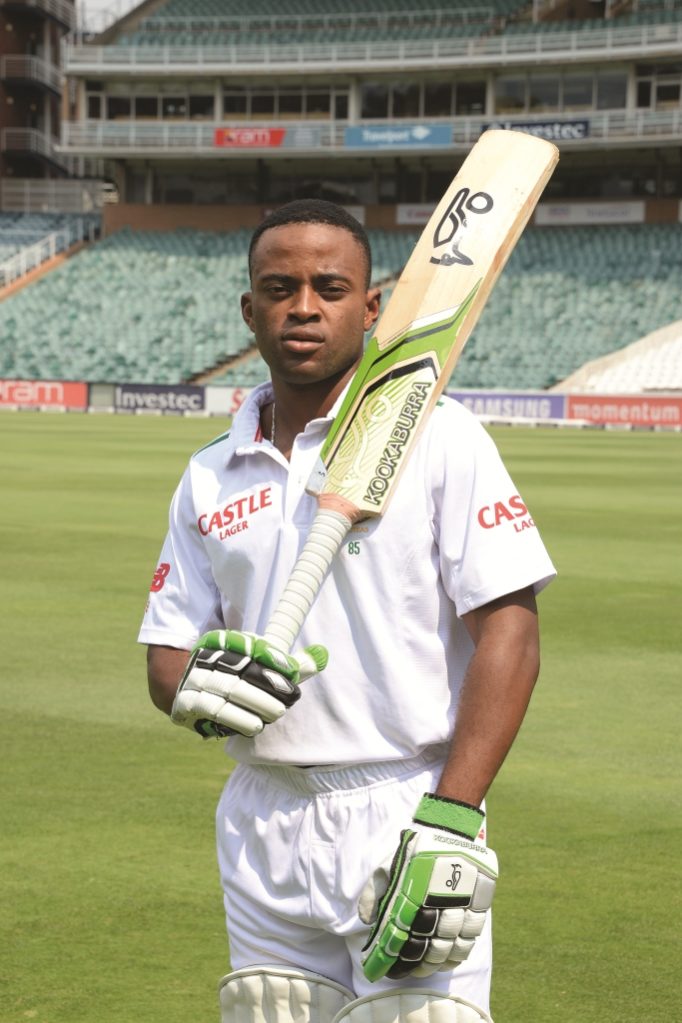On a warm Thursday afternoon, at the Wanderers cricket grounds in Johannesburg, he looks like a high school fan seeking autographs.
Look again; this is Temba Bavuma, a history-maker with a quick eye and a broad bat. The 5.47-foot tall cricketer was the first black South African to score a century in a test match.
Where he made history is part of his story. The century came at one of the most pristine cricket grounds in the world, watched by some of the richest people in Africa at Newlands in Cape Town. Bavuma looked like he was born there; he wasn’t. He was born just 10 kilometers away, in the impoverished Langa township. Two worlds that could hardly be further apart.
On the walls of Langa, the heroes of the streets are celebrated in paintings. Bavuma is up there among the likes of South African music icon Brenda Fassie, sporting heroes Thabo Mngomeni and Thami Tsolekile.
“Inspiring the kids is important because they need to see that there is a brighter future outside the streets of Kwa-Langa,” says Bavuma.
The 26-year-old batsman says in achieving his maiden test century in January, there was no greater feeling than being recognized by the youth in his township and the young children running up to him, seeking batting advice.
“Life has changed quite significantly since my milestone at Newlands. I spent a couple of days back home at Kwa-Langa and not only the elderly, but the youngsters were really proud of what I had done. The media also was flocking [after] me afterwards,” says Bavuma.
As he speaks, it is clear that the young batsman has his head firmly on his shoulders despite all the media hype.
Bavuma came from a family of sportsmen; inspiration came from his uncles. As a boy he would attend their cricket matches. His sports journalist father also loves the sport.
Bavuma’s talent was already evident in his early years at one of the oldest schools in South Africa, the South African College Junior School. When the family moved to Johannesburg, because of his father’s career, Bavuma would consolidate his cricketing career even further at St David’s Marist Inanda.
Now, he is one of a new generation of sought-after black cricketers that teams are prepared to pay top dollar for.
“Naturally you’ll find that franchises are going to end up paying more for your black African players because they need to field a certain number. It’s like in any market, you have bread and you have milk. Milk might cost more than bread and there’s a reason that milk costs more, maybe there’s a bit more demand for milk you know,” says Bavuma.
“I never actually saw myself competing with a fellow African brother or a black guy, I saw myself competing for six spots with all the other guys batting. That’s helped me to keep me much more motivated and to feed my competitive edge.”
Apart from the financial benefits he gets for being a black African cricketer, Bavuma says he has never experienced any form of racism from his teammates. He says he was welcomed warmly at the Proteas camp and he feels a part of a brotherhood. Bavuma notes, though, that he did receive some chirping on the pitch from English all-rounder Ben Stokes during the test series.
“He walked up to me while I was on the crease and he basically told me that I didn’t belong in the team. I guess chirping is part of the game,” says Bavuma.
The significant impact Bavuma’s 102 not out could have on children, especially to the majority of South Africa’s population was not lost on the young man who had grown up in the township.
“When I made my debut, I came to be a bit more aware of the significance behind it. It’s not just me making my debut for South Africa but it’s being a role model and inspiration for other kids, black African kids in particular. So this milestone solidifies this achievement,” says Bavuma.
Powerful words from a small man, with a big heart, born and bred in Langa.
